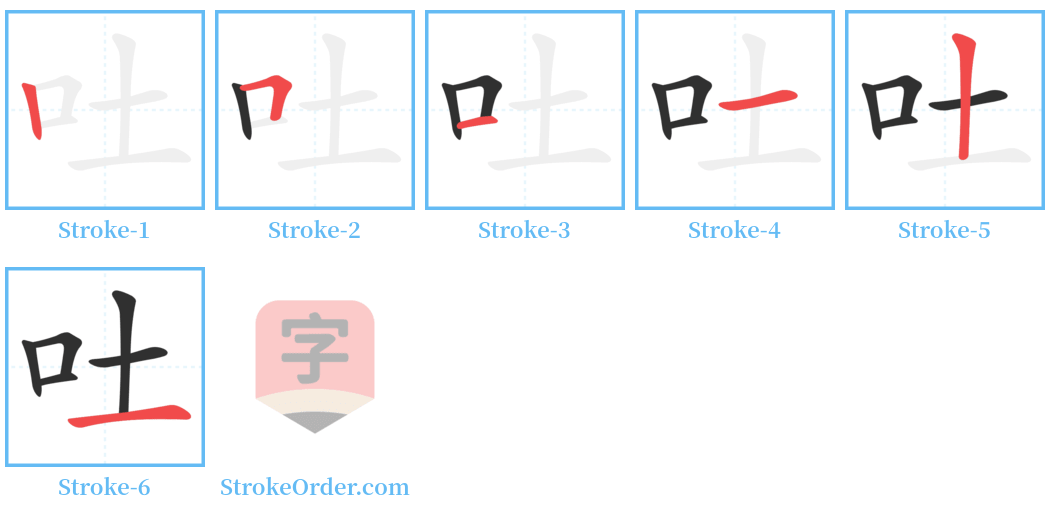吐 Stroke Order
Animated Stroke Order of 吐

Stroke Order Diagrams for 吐

Step-by-Step Handwriting Guide for 吐

Learn to Write Chinese Characters with Video Tutorials
Watch the video of writing the Chinese character "吐", learn the correct stroke order (笔顺) of the character "吐", and master the standard way of writing the character "吐".
Free Printable Handwriting Practice with Stroke Order: 吐
Printable Writing Practice Worksheet of "吐" in Portrait Orientation (Tian Zi Ge)

Printable Writing Practice Worksheet of "吐" in Landscape Orientation (Tian Zi Ge)

Information of 吐
Pinyin
tǔ、 tù
Radical
口
Strokes
6 strokes
Usage
★★★★★
Definition
to spit, vomit
吐 [tǔ]
动 verb
1. 使东西从口里出来。
(To make something come out from the mouth.)
Example: 吐痰 (spit phlegm), 吞吐 (to swallow and spit out).
2. 放出,露出。
(To release or reveal.)
Example: 高粱吐穗 (sorghum puts out its ears), 吐故纳新 (discard the old and accept the new).
3. 说出。
(To speak out.)
Example: 吐话 (to talk), 一吐为快 (to speak frankly).
4. 同本义 (spit).
5. 口说,陈说 (tell).
6. 显露,呈现 (display).
7. 发出;散发 (issue).
8. 长出 (come into being).
9. 抒发;抒写 (express).
10. 由里向外伸 (stick out). 指舌头 (referring to the tongue).
11. 使能够迅速硬化的粘液从口中出来形成丝、网、茧 (spin out) ——用于蜘蛛或蚕 (used by spiders or silkworms).
12. 摆出,亮出 (put on). 武术用语 (martial arts terminology).
13. 开放 (come into bloom).
14. 出 (give).
名 noun
1. 姓 (a surname).
2. 另见 (see also) tù.
吐 [tù]
动 verb
1. 内脏里的东西从口里涌出。
(Something from the internal organs comes out of the mouth.)
Example: 呕吐 (vomit), 上吐下泻 (vomiting and diarrhea).
2. 把吞没的东西退出来。
(To regurgitate what has been swallowed.)
Example: 吐还不义之财 (to disgorge ill-gotten gains).
3. 呕吐。呕出胃内容物 (to vomit).
4. 不自主地从嘴里涌出 (to throw up).
5. 退还非法的或不义的收益 (to disgorge).
6. 另见 tǔ.
to hum and haw (idiom); to mumble as if hiding sth / to speak and break off, then start again / to hold sth back
lit. to breathe out stale air and breathe in fresh (idiom, from Zhuangzi 庄子); fig. to get rid of the old and bring in the new
Tubo or Tufan, old name for Tibet / the Tibetan Tubo dynasty 7th-11th century AD / also pr. [Tu3 fan1]
Input Method for 吐
Pinyin
tu3
Wubi
kfg
Cangjie
rg
Zhengma
jbvv
Four Corner
64010
Unicode
U+5410
Same Pronunciation Characters